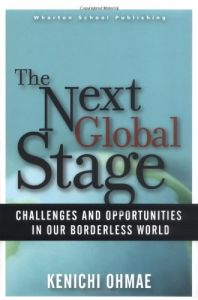Join getAbstract to access the summary!

Join getAbstract to access the summary!
Kenichi Ohmae
The Next Global Stage
Challenges and Opportunities in a Borderless World
Wharton School Publishing, 2005
What's inside?
Decentralized regions will beat nation states in the new global economy: their weapons are speed, change and flexibility.
Recommendation
This book is part reflection and part promotion. Author Kenichi Ohmae not only reflects on the course of globalization, but also takes the time to promote his distance-learning business and spotlight some of his friends. Ohmae, recently named advisor to Liaoning Province, particularly praises the province’s former governor. Some of Ohmae’s reflections are valuable bedrock information about globalization, but some seem curiously dated. He describes how surprised he was when he learned that people with whom he was dining had "Googled" him and could speak knowledgably about his life and work. He explains how capital moves unimpeded around the world, notes that ATMs and credit cards are important new mechanisms, and introduces a new business class whose members attended similar schools and all speak English. He teaches that regions should not cut themselves off from the flow of international capital and ideas, but instead should tap into it. Japan should be less protectionist and less centralized. And, yes, China is growing rapidly but treats workers horribly. getAbstract.com recommends this book to those who are new to globalization and need a prompt understanding of these fundamentals, plus ample background information and a bonus of more sophisticated interpretive insights (just not enough of them).
Summary
About the Author
Kenichi Ohmae is one of the world’s leading strategists, and the author of more than 100 books, including The Mind of the Strategist, The Borderless World, The End of the Nation State and The Invisible Continent. The Dean of the Kenichi Ohmae Graduate School of Management of BBT University in Japan, he was named the advisor of China’s Liaoning Province and Tianjin City in September 2002.



















Comment on this summary